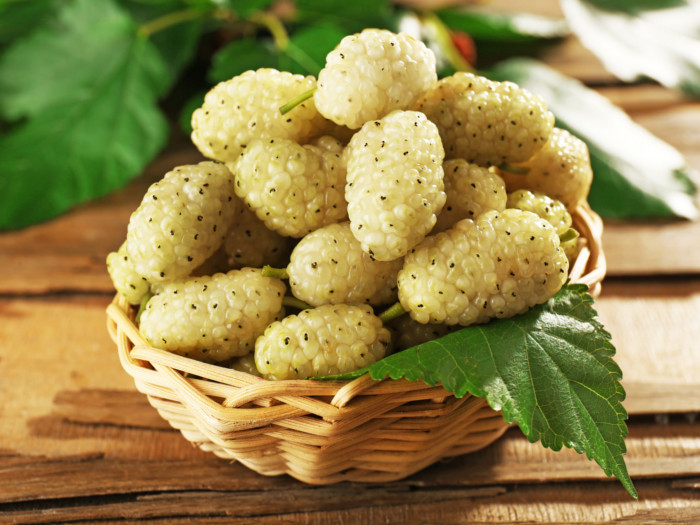Using white mulberry is a popular herbal practice around the world, with many benefits that some people might be unaware of.
What is White Mulberry?
White mulberry is a small variety of the mulberry tree, scientifically known as Morus alba [1]and native to Northern China. The white mulberry tree is famous for its leaves, which are a primary source of nutrients for silkworms that serve as a major industry in that area of the world. However, in traditional medicine, the leaves, fruit, and bark are used in various forms, due to their high flavonoid content, along with other essential nutrients, such as vitamin C, calcium, protein, and iron. A few more key active ingredients in this plant include luteolin, caffeic acid, gallic acid, resveratrol, and moracin, among others. [2]
The dried leaves of this tree are typically brewed into a tea, while the fruit tends to be dried and eaten directly. The essential oil from these leaves is also potent and is recommended for people with diabetes. This tree is now naturalized in many other parts of the world, including being widespread in the United States.

White mulberries taste sweet and blend well in many fruit salads. Photo Credit: Shutterstock
Benefits of White Mulberry
The top benefits of white mulberry include its ability to help manage diabetes, boost the immune system, reduce fatigue, and alleviate anxiety, among others.
Anti-Inflammatory
The diverse range of active compounds and volatile acids in these berries give them anti-inflammatory properties, leading the byproducts of this plant to be ideal for arthritis patients, as well as those suffering from chronic inflammation, gout, migraines, or irritable bowel syndrome (IBS). [3]
Heart Health
Research has found that eating white mulberries can help to lower total overall cholesterol levels while elevating HDL levels, which are the “good” fats, thus lowering your risk of atherosclerosis, heart attack, stroke, and coronary heart disease, among others. [4]
Depression Symptoms
One of the active components of the bark of the white mulberry has known anti-depressant qualities when brewed into a tea. Before using this herbal tea regularly, check with your doctor first, particularly if you are already on any anti-depressant medications. [5]
Diabetes
According to a 2008 animal study published in the Indian Journal of Pharmacology, a dosage of mulberry leaf extract (600 mg/kg body weight) has a positive impact on diabetes-induced rats. It can help restore beta cells that make insulin, a hormone that helps the control of blood glucose levels. [6]
Anticancer Properties
Mulberry has been studied for its anti-cancer properties. A 2018 research highlights that anthocyanins present in mulberry might have been useful in preventing the formation of gastric carcinomas in animal studies. Another 2017 research focusing on white mulberry also suggested that antioxidant-rich parts of this plant may be able to induce apoptosis. It’s potential as an anticancer agent could also be beneficial against hepatocellular carcinoma, a form of liver cancer. [7] [8]
Stress Response
The stress response in the body is responsible for everything from our anxiety levels to our metabolic processes, so using this tea to balance your nervous system and stress response can help with chronic inflammation, mood swings and everything in between!
Fatigue
If you suffer from chronic fatigue, or simply want a bit more energy, a cup of white mulberry tea can stimulate both physical and mental energy levels. [9]
Aids Cognition
The extract from the leaves of this plant has been studied extensively for their impact on memory and brain function. Research shows that using the extract can stimulate neural activity, which could help with Alzheimer’s treatment. [10]
